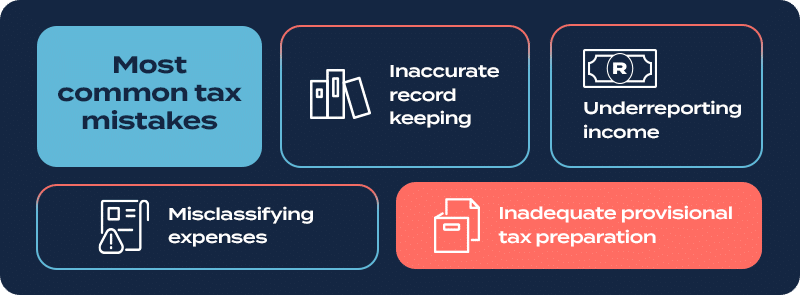The end of the tax year in South Africa can be a busy time for small business owners. But, meeting tax obligations doesn’t have to be a painful experience.
There are a few things you can do to eliminate the unnecessary rush and stress associated with small business tax planning.
Keeping up to date with tax deductions and credits can reduce your business’s tax liability and ensure you stay compliant.
As you prepare for the end of the tax year, there are a few important things to keep in mind. Read on to learn more about:
- Important tax deadlines and submission dates.
- How to optimise your tax strategy.
- Common tax mistakes to avoid.
As the 2025 tax year in South Africa ends on 28 February 2025, taking note of tax submission dates can help you prepare to meet all of your tax obligations and never miss a deadline. Proper planning and timely filing ensure compliance with South African Revenue Service (SARS) regulations, helping to avoid unnecessary penalties.
Key Tax Deadlines and Submission Dates to Remember for 2025
Provisional Tax
There are three provisional tax submissions in South Africa throughout the financial year. The next one, which is the second provisional payment, is due by 28 February 2025.
Value Added Tax (VAT) and PAYE (Pay-As-You-Earn) filing
Businesses with an estimated or actual turnover exceeding R1 million must register for VAT and pay 15% VAT on taxable goods and services. For February, business owners should note that VAT returns for the January tax period are due on the last business day of February, if filed electronically. PAYE for January salaries must also be submitted by 7 February. Staying compliant with these deadlines is critical to avoid penalties.
Read on to learn about expert tax insights and the three tax to-dos you should know to prepare your business for the end of the tax year:
1. Optimise your tax strategy
A strong tax strategy will help you tackle the tax year-end with confidence, and simplify the tax process.
With an actionable plan in place, your small business is positioned to take advantage of deductions and incentives like Section 12C allowances and Research and Development (R&D) tax benefits, which can reduce your tax liability.
R&D tax benefits are government incentives designed to encourage businesses to invest in innovation and technological advancement. These incentives typically come in the form of tax credits, deductions or grants.

Generate accurate financial reports
Start by reviewing your business’s income and generating an accurate financial report. Using a business bank account, which provides a clear overview of your business’s income and expenses can simplify the reporting process.
Accurate reporting makes it easier to identify and substantiate eligible tax deductions and allowances, such as those for capital expenses or professional costs.
Underreporting income or over-claiming for expenses can result in penalties, fines or trigger an audit.
Making sure you have clear and comprehensive financial records on hand is the first step towards achieving accurate reporting. Using tools like accounting software and automating processes can be beneficial.
Use an online tax calculator
To gain a clearer picture of your potential tax liabilities, consider using an online tax calculator. A tool like this can help you estimate the impact of various deductions and allowances and plan more effectively.
Look at your tax deductions
Find out more about available tax deductions and allowances specific to your industry. For example, capital expenditure applies to the manufacturing and construction industries, while medical practitioners have professional expenses.
You can claim deductions like business expenses and depreciation on assets. Another way to do this is to take advantage of tax incentives like Small Business Corporation (SBC) tax rates.
If your business invests in research and development (R&D), you can take advantage of the R&D tax incentives, particularly in sectors like IT and manufacturing. The SARS website provides a detailed guide on tax deductions relating to different industries.
Day-to-day taxable expenses small businesses should know about include all expenses that form part of the running costs. They include:
- Material and equipment costs
- Employee costs and administration costs
- Business/office rental costs
- Office supplies
- Phone costs
- Travel and transport, including business vehicle costs
- Uniforms (if needed)
- Wholesale purchase costs for goods resold
- Financial charges (such as bank fees), utilities
- Legal fees
- Insurance fees
- Marketing, advertising and promotion costs
2. Avoid common tax mistakes

When it comes to your business, making a mistake can lead to serious consequences. Musa Nyandeni, tax specialist at Sandvik Mining RSA, discusses tax in more detail.

“One of the most common mistakes that a small business can make is not knowing how to capitalise on tax incentives.” He adds: “It’s important to find out what incentives your business qualifies for and what the requirements are to fully benefit from them.”
Some other common tax mistakes include:
Misclassifying expenses
Misclassifying expenses can result in inaccurate tax filing, which can lead to under-claiming or over-claiming. To stay compliant, it’s important to understand the categorisation of expenses.
Underreporting income
Whether underreporting is intentional or a mistake it can cause your business to incur significant penalties and interest. SARS closely monitors income reports, and discrepancies can raise flags. It’s vital to ensure that all sources of income are accurately reported to avoid repercussions that could cost you.
Inaccurate record keeping
Keeping an accurate record of all your business’s transactions is essential, especially for VAT and PAYE submissions. Without detailed and clear records you may not be able to substantiate claims for deductions or meet compliance requirements.
“Accurate financial record keeping is the foundation of effective tax preparation. Without organised records, businesses risk missing deductions, misreporting income, or facing compliance issues – all of which can lead to costly penalties,” says Nyandeni.
Inadequate provisional tax preparation
Provisional tax payments are required twice a year, and if you do not set aside the appropriate amount or estimate your liability accurately, SARS may impose interest on the overdue amount. It’s important to calculate provisional tax carefully and plan your cash flow accordingly to avoid these additional charges.
3. Consult with a tax professional
By seeking the guidance of a tax expert, you can ensure that your tax obligations are fully compliant with South African tax laws and regulations.

Nyandeni says that not every business needs to hire a tax professional, but every business does need tax guidance from an expert.
He notes, “Every business should be able to consult someone familiar with taxes and can provide them with assistance and guidance with taxes. This is especially important because the consequences of not meeting tax obligations can be dire.”
A tax professional will help you identify potential tax-saving opportunities, which can reduce your overall tax liability.
Choose a tax expert with experience in your specific industry offering tailored advice that meets your business needs. Finding the right expertise will ultimately save you time, money and potential legal issues down the line.
If you don’t already have one, it’s also good to have a dedicated business bank account.
Get a capital boost to enlist the services of a tax consultant and optimise your tax strategy. Apply online in minutes to see if you qualify for up to R5 million in funding.




